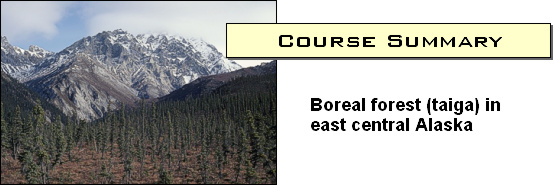The physical environment
An introduction to the major environmental factors that affect
organisms, including solar and terrestrial radiation, energy balance, temperature, water,
wind, and climate.
|
The response of individual organisms to
their environment
Topics on how organisms interact with various environmental factors,
including discussions on individual acclimation and species adaptation to the environment.
|
The nature of species, adaptation, and
population dynamics
This section includes discussions on ecotypes, species, and
populations, including the structure and growth of populations, interactions among
species, and models of population fluctuations. |
Communities and ecosystems
These major sections cover the major theories of communities and
succession, and the structure and function of ecosystems. Topics of discussion include
community structure and distribution in nature, energy flow and global mineral cycles, a
review of world ecosystems, and human influences on ecosystems. |
